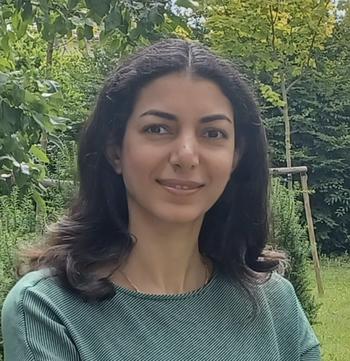Narges Doostani, PhD

Neural Dynamics of Visual Cognition
Alexander von Humboldt fellow
Room JK 25/221b
14195 Berlin
I joined the lab in January 2024 as a postdoctoral researcher. Prior to this, I obtained a B.Sc. in electrical engineering at the University of Tehran and an M.Sc. in electronics at Tarbiat Modarres University, Tehran, Iran. I did my Ph.D. in cognitive neuroscience at the Institute for Research in Fundamental Sciences (IPM) in Tehran, during which I worked with Dr. Maryam Vaziri-Pashkam and Prof. Gholam-Ali Hossein-Zadeh. Using fMRI data, modeling and simulations I studied the mechanisms underlying object-based attention in the human brain. My current postdoctoral fellowship is funded by the Alexander von Humboldt foundation from January 2024 to December 2025.
In my free time, I enjoy hiking, reading, listening to iranian traditional music, calligraphy and cooking.
I am interested in studying the mechanisms based on which attention affects neural responses in the human brain. I have investigated the effects of attention on neural responses in the visual cortex with isolated and cluttered stimuli, using computational modeling to reveal the underlying mechanisms of attention. Currently, I focus on how attention affects neural responses over time and to what extent the neural mechanisms of attention are common across modalities. In this research, I use a combination of fMRI, EEG, multivariate pattern analysis, and computational modeling.
I plan to conduct two projects during my stay in the lab.
In project 1, I aim to examine the time course of visual attention. Since the effect of attention on neural responses has been reported to depend on the number of presented stimuli, I will examine its time course with both isolated and cluttered stimuli. To do this, I will conduct an EEG experiment with object stimuli. Participants either attend or ignore presented objects and perform a task on the cued objects. I will then compare different correlates of attention in different task conditions using time-resolved multivariate analyses.
In project 2, I will use an equivalent strategy to determine the time course of attention in the auditory system and compare the temporal dynamics of attention across the visual and auditory systems. I will present auditory words that are either attended or ignored based on the cue the participants receive. I will then investigate the time course of the attention component of the signal in different conditions to determine the relationship between the temporal dynamics of attention and the stimuli.
Finally, I will use the results obtained in the first two studies to computationally model the time course of attentional modulation in the visual and the auditory domains. I will use artificial neural networks and dynamic models based on neural studies to determine if a single model can account for the observed effects of attention on cortical responses in the visual and auditory cortices.
Student supervision
If you are interested in an internship or consider completing your bachelor or master thesis in the lab, I would be happy to discuss potential research projects.